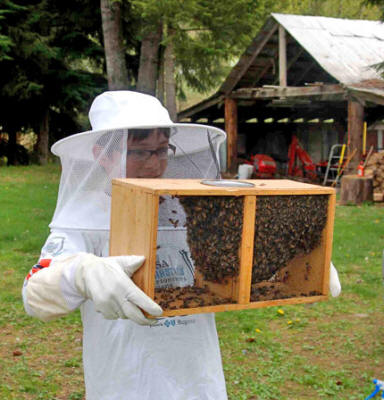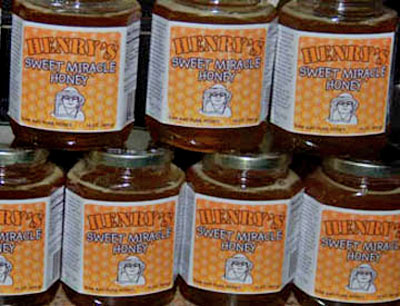|
from NaturalNews Website
The mission was unusual because he was
so young and new to country life. His family had moved from urban
Los Angeles to a rural spot in Washington State when Henry was ten.
And he contributes part of his profits to the Foundation for the Preservation of Honey Bees.
When he was eleven, he boarded a plane
with his mother and a stranger sat beside him. That stranger was a
bee farmer, who found a pair of ears with the precocious young boy.
Henry was informed of the bees important role of spreading pollen
around to maintain agricultural and wild plant life.
The bees disappearing from CCD has been
a mysterious honey bee pandemic for over a decade. The global
problem
synchronized with Bayer's introduction
of
neonicotinoidand clothianidin pesticides.
Both are toxic to insects that fly because the plants suck them up
from the soil and into plant pollen areas.
Bayer's profitable marketing continued
throughout the testing period of 2003 to 2007. The Environmental
Protection Agency (EPA)
considered Bayer's four year foot dragging test during their
marketing explosion as "scientifically sound."
This type of "wink and nod" generosity
is common toward chemical companies who do their own testing.
France, Italy, Germany, and Slovenia
have banned most of Bayer's pesticide use. In the USA and wherever
Bayer and other chemical companies have their way with top
government agency bureaucrats, grass roots action is the only
solution.
And of course, there's Henry Miller.
-
Teen Has a Passion for Beekeeping
- March 3, 2011 from GrowNorthwest Website
Each year when Henry Miller starts school his teacher asks the students to write down one interesting fact about themselves.
Henry said he has many facts about himself that his teachers have a hard time believing, but the 13-year-old often writes that he owns his own business. And no one ever believes him.
But he surprises his teacher and
classmates when he tells them about his business, Henry’s Sweet
Miracle Honey. Henry Miller looks at some of his bees.
PHOTO BY DENISE
MILLER Henry was sitting next to a man on an airplane two years ago, and they began talking. As it turned out the man is a beekeeper, and he and Henry began discussing the importance of bees.
Henry soon learned about colony collapse disorder, a problem putting the existence of bees in danger.
As a result of Henry’s passion to help
with this problem, a portion of the profits from Henry’s honey is
donated to the Preservation of Honey Bees.
Henry’s honey is a raw product, meaning it is not heated over 120 degrees or watered down, he said.
The raw honey is more likely to
crystallize, but that doesn’t mean it goes bad, Henry said. It just
needs to be heated up. Pasteurized honey doesn’t have the same
benefits and nutritional values as raw honey.
But to not let the name mislead
customers the honey doesn’t have magical powers.
Henry’s Sweet Miracle Honey products are available at four stores, including Nelson’s Market in Bellingham and Everybody’s Store in Van Zandt.
PHOTO BY DENISE
MILLER The business is a family operation with Henry, his mom Denise Miller and his dad Tom Roberts, doing all the work to keep the business running.
All the business duties are done by the family.
Henry’s dad designs the labels, Denise does demonstrations and Henry writes all the copy.
In Washington State, there are several other honey producers. Some have been around for generations.
But Henry and his family are learning a lot about their new endeavor.
In March, Denis and hopefully Henry, if he can take the time from school, will travel to the Natural Foods West Expo in Anaheim, CA to continue telling people about their special honey products.
More information
|


